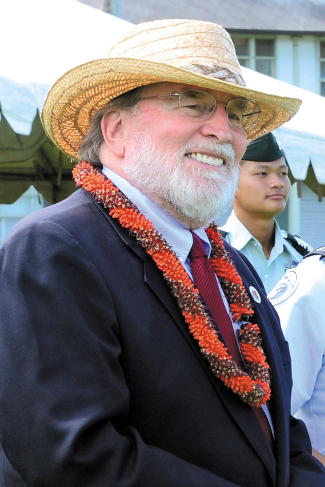The Power — And Paucity — Of TV
Last week Gov. Neil Abercrombie began running a television commercial in which he took credit for leading Hawaii out of the throes of the Great Recession into renewed prosperity. It had been tough, he said, but we’d come through.
Good ad, containing much with which many of us would agree, minus only the overreach found in almost any campaign commercial.
But I wish that the governor’s new ad wasn’t so slick.
How slick? It looked like it might slide right off the television screen and into the viewer’s living room. Too much money ($4 million-plus, at last count, in the governor’s campaign treasury) can be an obnoxious thing.
“Obnoxious” because it highlights once again how our elections have become sellathons, in which those with the most cash take home, far more often than not, the victory.
The governor’s primary challenger, state Sen. David Ige, did get on the same stage with Abercrombie last week, at a forum sponsored by the Japanese Chamber of Commerce. The press showed up. Television stations offered two minutes on the evening news; only the Star-Advertiser‘s Derrick DePledge offered coverage worthy of a voter’s attention.
Prior to the Aug. 9 primary, voters will have only two opportunities to see extended television coverage of the Abercrombie-Ige gubernatorial contest: July 3 on Insights on PBS, and July 10 on KGMB, KHNL and KFVE, the latter cosponsored by Hawaii News Now and Star-Advertiser.
That’s a shame. In 1858, Abraham Lincoln and Stephen Douglas debated seven times during their campaign for a United States Senate seat from Illinois. They appeared in small cities the length and breadth of Illinois. One candidate would speak for an hour, the second for 90 minutes. The first would then rebut for 30 minutes. Three hours of debate in the public square. Twenty-one hours in all.
Today television is our public square, and somehow — by law, by shaming, however — candidates must be compelled to meet and debate issues before the folks.
If we don’t require them to do so, the incumbent, even one as adept in public discourse as Abercrombie, will debate once, maybe twice, then go hide behind his or her paid advertising. That’s the way it’s been for as long as I can remember.
But slick television advertising isn’t always the most effective. Consider Lt. Gov. Shan Tsutsui’s brief, funny “How do you pronounce my name?” spot. If there were Emmys offered for campaign ads, it would be a nominee.
You know the one. Half-a-dozen people wrestle unsuccessfully with “Tsutsui,” inter-cut with the lieutenant governor’s bemused facial responses.
Watch the ad once and you will remember Tsutsui’s name, however you choose to pronounce it. Tsutsui’s bemusement humanizes him. His final “Just call me Shan (rhymes with Dan, not Don)” democratizes him as well.
Finally, talking television, Pacific Resource Partnership’s 2012 campaign to undermine the mayoral candidacy of former Gov. Ben Cayetano offers a prime example of using the medium to pollute the public square.
Cayetano entered that campaign to stop rail, and he brought his reasons and his well-earned reputation for candor and honesty to the fight.
The architects of PRP’s campaign to stop Cayetano spent half-a-million dollars on television advertisements. They spent a half-a-buck of that sum to make the case for rail, the rest, night after night, ad after ad, ad nauseum, to shred Cayetano’s reputation.
Cayetano lost the election, but he never lost his reputation. PRP apologized and paid guilt money. Little enough.
dbboylan@yahoo.com






